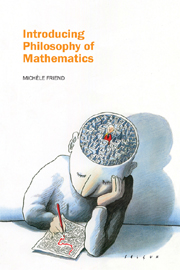6 - A pot-pourri of philosophies of mathematics
Summary
Introduction
Frege took exception to three philosophies of mathematics: empiricism, psychologism and formalism. His criticisms were so strong and influential that either little attention has been accorded to these philosophies, or they have been strongly modified or retrenched in answer to his criticisms. The criticisms can be found in the first half of Frege's Grundlagen (1980a) and in his correspondence, and they are well worth reading. In this chapter, we shall discuss these three philosophical positions as well as others that grew out of them. This will help us gain a better understanding of the positions we have discussed so far, since they will serve as a contrast.
Most of the sections of this chapter come in pairs, and should be read as such. Fictionalism (§3) can be seen as a rethinking of empiricism and naturalism (§2). Husserl's phenomenological approach (§5) is closely related to psychologism (§4). Hilbert (§7) is often thought of as a formalist (§6). The last two sections encourage a rethinking of the whole project of the philosophy of mathematics. The questions asked by a Meinongian philosophy of mathematics and by Imre Lakatos are different. Interestingly, all these philosophical ideas, from empiricism to Hilbert, are finitistic in some sense. Thus we return to our notion of potential infinity, and the view that mathematics is a process, not a static body of truths. So this chapter gives points of comparison with the subjects previously discussed and then goes on to give the reader a sense of the breadth of the philosophy of mathematics.
- Type
- Chapter
- Information
- Introducing Philosophy of Mathematics , pp. 127 - 166Publisher: Acumen PublishingPrint publication year: 2007



